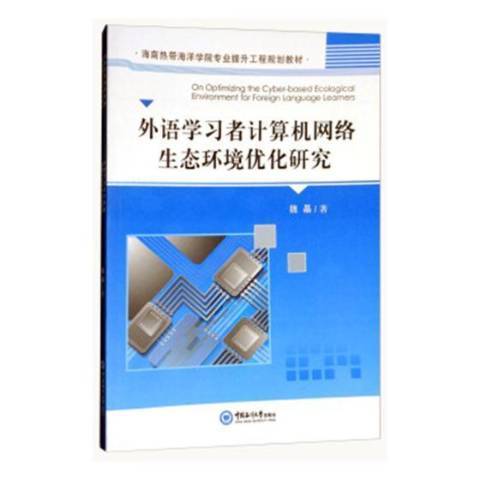《外語學習者計算機網路生態環境最佳化研究》是2018年中國海洋大學出版社出版的圖書。
基本介紹
- 中文名:外語學習者計算機網路生態環境最佳化研究
- 作者:魏晶
- 出版社:中國海洋大學出版社
- 出版時間:2018年3月1日
- 開本:16 開
- 裝幀:平裝
- ISBN:9787567016316
內容簡介,圖書目錄,
內容簡介
基於計算機網路技術的外語學習已經成為當前高等學校外語學習的輔助實踐和喜歡方法,《外語學習者計算機網路生態環境最佳化研究(英文版)/海南熱帶海洋學院專業提升工程規劃教材》以生態學原理為理論基礎對計算機網路環境下外語學習環境進行研究和探討,在實證研究和實地考察的基礎上,提出對計算機網路環境下外語學習生態環境進行最佳化的原則、基本要求,並將其最佳化成一種綜合、動態、平衡的學習環境。
《外語學習者計算機網路生態環境最佳化研究(英文版)/海南熱帶海洋學院專業提升工程規劃教材》共分七章,運用生態學理論中生態位和生態平衡系統理論來最佳化失調的四大學習環境,提出最佳化的基本要求和原則。
圖書目錄
Chapter 1 Introduction
1.1 The Origin of the Topic Selection
1.1.1 Background
1.1.2 Research Basis and Conditions
1.2 The Targeting Problems
1.3 Research Purpose and Significance
1.4 Theoretical Background
1.5 Research Methods
1.6 Structure and Main Content
Chapter 2 Literature Review and Theoretical Framework
2.1 Literature Review
2.1.1 Previous Study of CALL Abroad and at Home
2.1.2 Research Status of Cyber-based Foreign Language Ecological Teaching & Ecological Environment
2.2 Theoretical Framework
2.2.1 CALL
2.2.2 The Relevance Between Information Technology and Foreign Language Teaching and Learning
2.2.3 Cognitivism ( Learning Theory )
2.2.4 Constructivism ( Learning Theory )
2.2.5 Ecology Theory
2.3 Research Design
Chapter 3 Overview on Problems in Cyber-based Foreign Language Learners' Environment
3.1 Imbalances of Physical Learning Environment
3.2 Imbalances of Resourceful Learning Environment
3.3 Imbalances of Technological Learning Environment
3.4 Imbalances of Emotional Learning Environment
Chapter 4 Principles for Optimizing Cyber-based Foreign Language Learners' Environment
4.1 Basic Requirements for Its Optimization
4.2 Fundamental Principles for Its Optimization
4.2.1 General and Integrated Effect
4.2.2 Principle of Niche Emphasis
4.2.3 Degree of Resistance
4.2.4 Principle of Expansion and Adaption
4.2.5 Flexible Adaptation and Development
4.2.6 Principle of Growth and Restraint
4.3 Comparison of Two Cyber-based Foreign Language Learners' Environments: Before Optimization and After Optimization
4.3.1 The Learning Environment Before Optimization from the Perspective of Ecological Balance
4.3.2 The Crucial Optimization Principle——Under Ecological Niche Principle to Construct a Harmonious, Dynamic and Flexible Environment
4.3.3 Result After Optimization——An Integrated, Dynamic and Balanced Ecological Learning Environment
4.3.4 Conclusion: the Model of Cyber-based Dynamic and Balanced Foreign Language Learners' Ecological Environment
4.4 Ecological Reflections on Foreign Language Learners' Environment
4.5 Importance of Optimizing Cyber-based Learning Environment
4.5.1 Effective Means to Improve Learners' Learning Efficiency
4.5.2 Important Means to Construct a Harmonious Campus
4.5.3 Crucial Guarantee to Maintain Learners' "Best Niche"
4.5.4 Essential Foundation to Keep Harmonious Coexistence of Teachers and Students
4.5.5 Continual Momentum to Ensure Sustainable Development of Ecological Class
Chapter 5 Empirical Investigations on Constructing and Optimizing Cyber-based Foreign Language Learners' Ecological Environment
5.1 Research Background
5.2 Method
5.3 Object and Content
5.3.1 Object
5.3.2 Content
5.4 Design and Procedure
5.5 Quantitative Data Analysis on Investigation Result
5.5.1 Research Result
5.5.2 Analysis of Investigation Results
5.6 Empirical Investigation of Foreign Language Learning in Optimized Cyber-based Ecological Environment
5.6.1 Optimized Physical Ecological Environment Improving Learning
5.6.2 Optimized Resourceful Ecological Environment Improving Learning
5.6.3 Optimized Technological Ecological Environment Improving Learning
5.6.4 Optimized Emotional Ecological Environment Improving Learning
5.7 Inspiration on Foreign Language Learning from Empirical Research
Chapter 6 Constructing the Model of Foreign Language Learners' Cyber-based Learning Environment
6.1 Characteristics of Cyber-based Learning Ecological Environment
6.1.1 Systematic Integrity
6.1.2 Stable Balance
6.1.3 Dynamic Openness
6.2 Three Interactive Relationships
6.2.1 Teacher-learner Relationship
6.2.2 Learner-learner Relationship
6.2.3 Learner-computer Relationship
6.3 Three Ecological Relationships
6.3.1 Cyber-based Foreign Language Learners' Environment is an Ecosystem
6.3.2 Cyber-based Foreign Language Learners' Environment Has Its Own Ecological Niche
6.3.3 Cyber-based Foreign Language Learners' Environment is an Ecological Environment
6.4 Foreign Language Learners' Cyber-based Learning Environment Model
6.5 Results and Discussion
Chapter 7 Conclusion
7.1 Research Review
7.2 Innovations of the Study
7.2.1 Innovative Study of Optimizing Four Imbalanced Cyber-based Sub-environments
7.2.2 Innovative Study of Constructing an Optimized Ecological Environment Model for Cyber-based Sub-environments
7.3 Limitations of the Study
7.4 Future Prospects
Bibliography
Appendix

